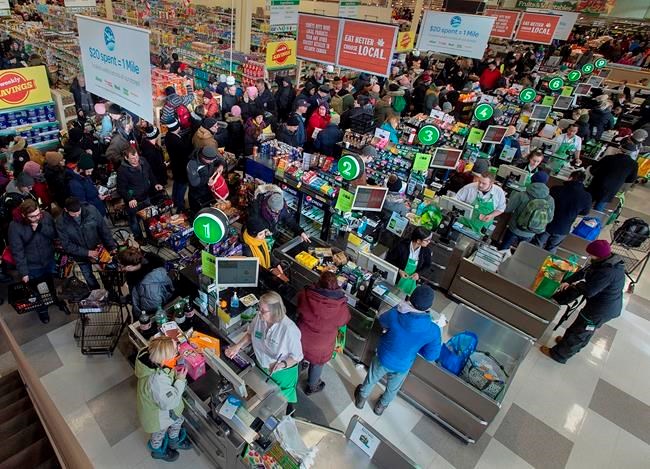The head of Sobeys Inc. says the grocer won't follow its Canadian competitors in unilaterally hiking supplier fees, calling the practice "hard to believe and repugnant."
Michael Medline, president and chief executive of Sobeys and its parent company Empire Company Ltd., said the move by some grocery retailers to impose fee increases on suppliers has left consumer goods companies feeling bullied.
"This is the worst relationship I've ever seen in my couple of decades in retail," he said during a virtual talk with the Empire Club of Canada on Wednesday.
"I don't think it's healthy … some of these behaviours are just plain bad for Canada."
Medline added: "It discourages innovation in terms of products. It hollows out our country in terms of head offices for (consumer packaged goods) companies and jobs."
Medline said it's time for a code of conduct in the grocery industry – the first CEO of a major grocery chain in Canada to publicly support the idea.
Grocery stores charge vendors fees for services like marketing, shelf placement, inventory costs, packaging and deliveries.
Loblaw Companies Ltd., Walmart Canada and a national buying group that represents Metro Inc. have all said they plan to increase fees.
While these costs have historically been negotiated between retailers and suppliers, the big grocery chains are increasingly unilaterally imposing the charges. They're also introducing new fees for capital investments such as upgrades to stores and e-commerce operations.
Based in Stellarton, N.S., Sobeys operates across Canada under several banners including Sobeys, FreshCo and Safeway.
Medline said the practice of having a small handful of large grocers impose fees on suppliers risks hurting farmers, consumers and "mom and pop" food retailers in Canada.
"We negotiate and communicate and discuss things with our supplier partners," Medline said. "Sometimes supplier partners aren't going to like what they hear and sometimes we won't. But across-the-board goring of each other does not work."
Medline said he is open to a code of conduct if it were fair and applied to all grocers and suppliers.
"It has to cut both ways," he said. "Suppliers need to also promise to play fair."
A number of groups that represent independent grocers, producers and suppliers have repeatedly called for a code of conduct.
In a letter Tuesday to federal Agriculture and Agri-Food Minister Marie Claude Bibeau and Ontario's Minister of Agriculture and Food Ernie Hardeman, eight organizations said consolidation in the food industry has distorted fair market practices.
The groups, which include the Canadian Federation of Independent Grocers, said large retail chains like Walmart and Loblaws are imposing unilateral costs on suppliers, fining suppliers for shortages and offloading operating costs onto suppliers.
"These practices have and will continue to have, a significant impact on the ability of Canada’s independent retail grocers, farmers, food and beverage producers and processors, to compete fairly and at the same time, innovate and invest in their own businesses," the letter said.
"There is also no doubt that these practices, if left unchecked, will continue to impact food security, food prices and employment," it added.
The organizations are asking for the issue to be added to the agenda at the next meeting of agriculture ministers in November.
The federation applauded Medline's support for a grocery code of conduct for Canada.
"We have fought many years for this code on behalf of independent grocers, but we believe the development of such a document is also in the best interests of the food industry as a whole," spokesman Gary Sands wrote in an email.
"Our goal now is to see a process developed under the auspices of government, that allows industry to work together at developing a fair and balanced code of conduct that applies to all stakeholders — retailers, suppliers, wholesalers and distributors — in the industry."
Walmart Canada announced a fee hike in July that prompted United Grocers Inc., a national buying group that represents Metro Inc., to tell suppliers it expects the same costs as competitors.
Last week, Loblaw told some suppliers that the cost of getting products on shelves would go up in January.
Citing plans to improve its in-store and digital operations over the next five years, the grocery giant said existing charges for delivery would go up, and a new 1.2 per cent fee would be introduced.
This report by The Canadian Press was first published Oct. 28, 2020.
Companies in this story: (TSX:L, TSX:MRU, TSX:EMP.A)
Brett Bundale, The Canadian Press

